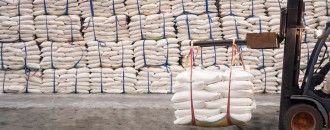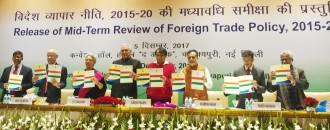
Too early to comment on new foreign trade rules: Exporters
The Dollar Business Bureau  Days after mooting a Customs Clearance Facilitation Committee (CCFC) at every major customs seaport and airport, by the Customs Board, the Directorate General of Foreign Trade (DGFT) has come up with amendments in the Foreign Trade (Regulation) Rules, 1993, and it said that the rules may be called as Foreign Trade (Regulation) (Amendment) Rules, 2015. One of the key amendments is the inclusion of services and technology on the list of exporter/importer of goods. Earlier, the importer/exporter has been defined as the one who exports/imports goods and holds a valid Importer-exporter code number. In the new amendment, the licencing authority is the Director General (DG) to grant or renew a licence, certificate, scrip or any instrument bestowing financial benefits. Earlier, the licencing authority was assigned by the DG. The policy in the new amendment means the Foreign Trade Policy, as formulated and announced by the Central government. In the new regulation, the clause of ‘schedule’ has been deleted and the clauses that speak on ‘section’, ‘special license’ and ‘value’ remain as it is. As per the existing rule, a person may make an application for grant of licence or certificate, if it doesn’t affect the country trade or any legal procedures associated with it. But in the new rule, a person may have to go through the procedure and also will be accompanied by a fee for his application. The clause (f) under Section 7—Refusal of Licence of the old rule, which has the applicant as a managing partner in a partnership firm or a director of a private limited company, is added with ‘proprietor of a proprietorship firm’s terms along with the private limited company. According to the old rule, on the goods importation into or exportation out of any customs ports, whether liable to duty or not, the owner of such goods shall state the value, quality and description of such goods in the Bill of Entry or the Shipping Bill or any other documents prescribed under the Customs Act, 1962 (52 of 1962). In the new rule, the owner should show that the value, quantity, quality and description of such goods connected with services or technology are in accordance with the terms of the export contract between sellers and buyers. The mention of ‘any imported goods or materials’ under ‘Confiscation and Redemption’ procedures in the old rule, shall be added with the ‘goods for export or materials connected with import or export of services or technology in the new rule. When contacted by The Dollar Business, a majority of exporters were unaware of the new ‘rules.’ An exporter on conditions of anonymity said that the impact of most of the ‘rules’ will only be felt at the port level and it was too early to comment. Another exporter said that these ‘rules’ might not affect the day-to-day implementation of exports processing. The inclusion of ‘service sector’ is a welcome move as India is more focusing on services exports as announced by the Prime Minister, Narendra Modi at the recently concluded Global Exhibition on Services (GES), added another exporter. “We generally go by the clearances of the various departments and not by any Act,” concluded a major exporter.
Days after mooting a Customs Clearance Facilitation Committee (CCFC) at every major customs seaport and airport, by the Customs Board, the Directorate General of Foreign Trade (DGFT) has come up with amendments in the Foreign Trade (Regulation) Rules, 1993, and it said that the rules may be called as Foreign Trade (Regulation) (Amendment) Rules, 2015. One of the key amendments is the inclusion of services and technology on the list of exporter/importer of goods. Earlier, the importer/exporter has been defined as the one who exports/imports goods and holds a valid Importer-exporter code number. In the new amendment, the licencing authority is the Director General (DG) to grant or renew a licence, certificate, scrip or any instrument bestowing financial benefits. Earlier, the licencing authority was assigned by the DG. The policy in the new amendment means the Foreign Trade Policy, as formulated and announced by the Central government. In the new regulation, the clause of ‘schedule’ has been deleted and the clauses that speak on ‘section’, ‘special license’ and ‘value’ remain as it is. As per the existing rule, a person may make an application for grant of licence or certificate, if it doesn’t affect the country trade or any legal procedures associated with it. But in the new rule, a person may have to go through the procedure and also will be accompanied by a fee for his application. The clause (f) under Section 7—Refusal of Licence of the old rule, which has the applicant as a managing partner in a partnership firm or a director of a private limited company, is added with ‘proprietor of a proprietorship firm’s terms along with the private limited company. According to the old rule, on the goods importation into or exportation out of any customs ports, whether liable to duty or not, the owner of such goods shall state the value, quality and description of such goods in the Bill of Entry or the Shipping Bill or any other documents prescribed under the Customs Act, 1962 (52 of 1962). In the new rule, the owner should show that the value, quantity, quality and description of such goods connected with services or technology are in accordance with the terms of the export contract between sellers and buyers. The mention of ‘any imported goods or materials’ under ‘Confiscation and Redemption’ procedures in the old rule, shall be added with the ‘goods for export or materials connected with import or export of services or technology in the new rule. When contacted by The Dollar Business, a majority of exporters were unaware of the new ‘rules.’ An exporter on conditions of anonymity said that the impact of most of the ‘rules’ will only be felt at the port level and it was too early to comment. Another exporter said that these ‘rules’ might not affect the day-to-day implementation of exports processing. The inclusion of ‘service sector’ is a welcome move as India is more focusing on services exports as announced by the Prime Minister, Narendra Modi at the recently concluded Global Exhibition on Services (GES), added another exporter. “We generally go by the clearances of the various departments and not by any Act,” concluded a major exporter.
This article was published on April 25, 2015 – 7:08 pm IST.



-Vertical.jpg)

 to success.
to success.